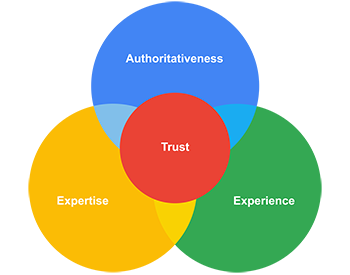SEO Services
 We use Search Engine Optimisation (SEO) to get you more website visitors and more sales.
We use Search Engine Optimisation (SEO) to get you more website visitors and more sales.
Search Engine Optimisation
Using a combination of techniques (see below), we can help you optimise the content and structure of your website to drive quality organic traffic and boost its search engine rankings.
- On-page SEO
- Off-page SEO
- Keyword research
- Competitor analysis
- Link building
- Content creation

According to a recent report by Backlinko the number 1 search result in Google gets 27.6% of all clicks and the top five results get nearly 70% of the total traffic.
Organic search continues to be the main source of trackable website traffic. Research from Brightedge determined that organic search makes up 53.3% of all web traffic.
Some interesting statistics on search results:
- Position number 1 gets a Click Through Rate over ten times higher than a ranking at position number 10.
- Position number 2 will generate an average of 3x more clicks than a result in position number 6.
- Results on the second page of Google have a Click Through Rate of less than 1% for each position.
SEO also:
- Delivers the best conversion rates as people actively searching for the problem you solve - or your products or services – are directed to your website.
- Is one of the best and most cost-effective way to increase your brand awareness and your business’s reputation.
- Works around the clock
- Is a cost-effective, long-term investment. SEO is generally more economical in the long term, with better Return On Investment than Pay Per Click advertising
- Provides measurable results. You can track key metrics like website traffic, keyword rankings, bounce rates, and conversion rates and use the insights to improve your SEO strategy.
Why use us for your SEO?
Using our expertise and experience we can get better results for you more quickly. We know what will work well and the best combination of techniques to use to get the best results.
Find out more about the marketing services we offer
What SEO ranking factors are the most important?
The 5 SEO ranking factors that we think businesses should focus on first, and what you can do to improve them.
 1. High quality content
1. High quality content
The objective of Google, and other search engines, is to provide users with relevant, high quality search results.
Google prioritises E-E-A-T (Experience - Expertise - Authoritativeness - Trustworthiness) to help find the most reliable, trustworthy, and valuable content for any query. Businesses can benefit from that by demonstrating:
Experience
Show that your content is created by people with direct, first-hand experience of the topic. This can be achieved for example by business/ individuals:
- Sharing opinions, tips and advice
- Referencing your own experiences within website content
- Creating and sharing ‘behind the scenes’ content
- Including author bios
Expertise
Demonstrate expertise on a subject through the depth and accuracy of your content, by creating articles or pages of helpful content about common issues and referencing reputable sources and studies.
Authoritativeness
Where you have expertise or experience around a topic, then you can become an authority on it.
Build the authority of your business by consistently publishing high-quality, valuable content, earning coverage and mentions from other respected sites, and growing your reputation within your industry.
Trustworthiness
Be transparent about who is behind your content, provide clear contact and customer service information, maintain a positive reputation, and follow ethical content practices.
Whilst E-E-A-T is not a direct ranking factor in Google’s search algorithm, optimising for it can significantly improve a site’s search performance over time.
 2. Backlinks
2. Backlinks
Backlinks are one of the cornerstones of website authority and credibility in the eyes of search engines.
Links from other websites to your website act like a ‘vote of confidence’. The more high-quality backlinks you have, the better your website will rank.
Some of the ways you can attract more quality backlinks are:
- By becoming a trusted source for reporters and bloggers writing about issues in your industry / area of expertise
- Creating ‘why’ or ‘what’ content around topics that you know will generate links
- Featuring valuable step by step ‘How to guides’ on your website that will encourage other sites to link to your content
- Email outreach - share useful content with creators who may be interested in linking to it
 3. Technical SEO
3. Technical SEO
So that search engines can easily index and understand the content your website needs to be technically sound.
Technical SEO can boost your visibility in search results and a website’s speed, mobile-friendliness and ‘crawlability’ are confirmed ranking factors.
Some of things you can do to improve your technical SEO include:
- Creating an SEO-Friendly site structure ensuring that all the pages are just a few clicks away from your homepage.
- Using an XML sitemap and submitting it to Google via Google Search Console (GSC)
- Finding and fixing duplicate content issues
- Making sure that your website is mobile-friendly. Google uses mobile-first indexing so it looks at mobile versions of webpages to index and rank content.
- Improving your page speed by compressing images, using a content distribution network (CDN) and minifying HTML, CSS, and JavaScript files
You can use Google’s PageSpeed Insights tool to check the speed of your website and to check how compatible it is with mobile devices.
 4. Keyword optimisation
4. Keyword optimisation
Optimising content for relevant keywords, especially those with significant search volume, is a fundamental aspect of SEO.
It helps improve a website’s visibility in search engine results pages (SERPs), driving more organic traffic to your site.
It’s about using the right keywords in the right places and in the right ways - creating quality content that’s aligned with search intent.
 5. User experience (UX)
5. User experience (UX)
A good user experience (UX) is when website visitors’ interactions with your website are positive.
Your website must deliver a good User Experience (UX) to be successful in SEO – many UX elements can directly influence search rankings.
Some of the key elements that contribute to a good UX have already been featured above:
- Website performance - making sure your pages load quickly and are responsive is an absolute must
- Mobile experience - with Google's mobile-first indexing, having a site that works well on mobile devices is critical
Other elements that help provide a good UX include:
- Design and layout - make your website content easy to read and easy to find by arranging information logically, formatting it well and making it clear and easy to understand
- Usability - make your navigation intuitive, have clear buttons, and ensure that users can interact with your website as easily as possible
PPC advertising can help support your SEO efforts. Find out how we can help you with your PPC advertising.
 Why SEO isn’t just about rankings
Why SEO isn’t just about rankings
Many businesses and marketers still focus on achieving the top spot on Google, but rankings alone don’t guarantee meaningful business results.
The way people search for information is changing. If you're not adapting your approach to reflect that your SEO efforts probably won't deliver the results you’d hoped for.
Businesses should take a broader, more strategic approach to SEO and change their thinking:
1. SEO isn’t just about ranking, it’s about influence
SEO isn’t just about search engine results pages (SERPs) anymore. It’s about ensuring your brand is present and trusted wherever your audience seeks answers.
Having influence, visibility, and authority across multiple platforms is critical.
Google is no longer the only player. Decision-makers consume information from YouTube, LinkedIn, Reddit, industry forums, and AI-driven search engines. If your brand isn’t shaping conversations beyond traditional rankings, you’re missing out on key opportunities to influence buying decisions.
2. Think about AI, not just keywords
Historically, keyword research and link-building has been prioritised in SEO, but AI-driven search engines like Google’s Search Generative Experience (SGE), ChatGPT, and Perplexity are transforming how users find and consume information
To take advantage of this marketers must embrace AI-friendly content strategies such as:
- Conversational, long-form content that aligns with how AI models retrieve information
- Entity-based SEO, where Google prioritises recognised brands and experts over generic content
- Structured data and schema markup to enhance search engine comprehension
For your SEO strategy to be truly successful, it must evolve beyond static keywords and link-building and optimise for how AI-driven search retrieves, interprets, and presents content.
3. Don’t obsess over traditional SEO metrics
When it comes to SEO, marketers often focus on traffic, rankings, and domain authority, but these metrics don’t always translate to revenue.
So, what does matter?
A boost in rankings is pointless if it doesn’t drive meaningful engagement or revenue.
Think about:
- Lead quality over raw traffic: Are the right people finding your content?
- Conversion impact: Does SEO contribute to sales, sign-ups, or inquiries?
- Engagement and retention: Are visitors staying, interacting, and returning?
SEO should be viewed as business driver, not just a traffic generator.
4. Brand matters more than backlinks
For years, SEO best practices have placed great emphasis on technical fixes, backlink building, and volume of website content. But with Google’s emphasis on Experience, Expertise, Authority, and Trust (E-E-A-T), brand reputation and credibility now matter more than backlinks.
Google is getting better at recognising real-world trust signals:
- Is your brand frequently mentioned in industry discussions?
- Do authoritative figures cite your insights?
- Is your content genuinely valuable, or is it optimised just for search rankings?
Focus on building brand equity, thought leadership, and authoritative content that naturally earns trust and citations, rather than chasing links and keyword density.
5. Treat SEO as part of your demand generation strategy
SEO is a key part of demand generation and should be tailored to creating content that moves potential buyers through their journey.
The most successful brands don’t just optimise for clicks; they optimise for:
- Audience education: Providing valuable insights before customers even realise they need a product
- Brand affinity: Ensuring prospects recognise and trust the brand when they are ready to buy
- Full-funnel impact: Crafting content that supports the entire buyer journey, not just top-of-funnel discovery
Summary
Adapt and thrive! SEO is no longer just about ranking higher. It’s about shaping conversations, building authority, and driving real business results.
Forward-thinking marketers must move beyond traditional tactics and embrace SEO as part of a more comprehensive approach that integrates brand marketing, AI-driven search, and demand generation.
Ready to transform your SEO strategy and drive real results? Please get in touch if you’d like to find out how we can make your SEO work harder and smarter for you.